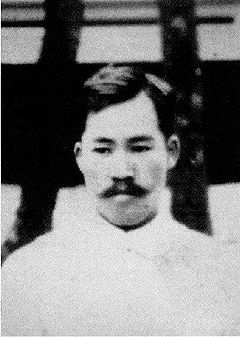Hakaru Hashimoto
| Hakaru Hashimoto | |
|---|---|

Hakaru Hashimoto circa 1912
|
|
| Native name | 橋本 策 |
| Born |
May 5, 1881 Mie Prefecture, Japan |
| Died | January 9, 1934 (aged 52) Japan |
| Cause of death | Typhoid fever |
| Nationality | Japanese |
| Education | Kyushu University |
| Occupation | Physician |
| Known for | Hashimoto's thyroiditis |
Hakaru Hashimoto (橋本 策 Hashimoto Hakaru?, May 5, 1881 – January 9, 1934) was a Japanese medical scientist of the Meiji and Taishō periods.
He was born on May 5, 1881, in the village of Midai, Nishitsuge, in Mie Prefecture. He graduated from Kyushu University medical school in 1907. He then entered the First Surgical Bureau and studied medicine under the direction of Professor Hayari Miyake (1867–1945), the first Japanese neurosurgeon. Some years after, he studied pathology under Professor Eduard Kaufmann at the Georg-August University of Göttingen. He also studied in England. As World War I was about to break out, he was forced to return home to Japan. In 1916, he came back to his hometown, Igamachi, and became the town doctor. He fell ill with typhoid fever and died at home on January 9, 1934.
In 1912, he published a paper, Kōjōsen rinpa-setsu shushō-teki henka ni kansuru kenkyū hōkoku or Zur Kenntnis der lymphomatösen Veränderung der Schilddrüse (Struma lymphomatosa) or (Report on lymphomatous goiter) in "Archiv für klinische Chirurgie", Berlin, 1912:97:219-248.
Years later, this paper was evaluated by English and American researchers, and the disease it described was recognized as an independent illness.
In American medical books, it was named Hashimoto's thyroiditis.
To honor his achievements, Kyushu University named a road on its Maidashi campus "Hashimoto Street".
...
Wikipedia
